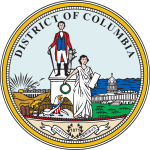From Wikipedia, the free encyclopedia
1971 United States House of Representatives election in the District of Columbia|
|
|
|
|
 Map of the District of Columbia At-Large district.
Map of the District of Columbia At-Large district.
On March 23, 1971, the District of Columbia held a special election for its non-voting House delegate representing the District of Columbia's at-large congressional district. This was the first election for the newly re-created district since Norton P. Chipman briefly held the seat during the Reconstruction Era. The winner of the race was Walter E. Fauntroy, a Democrat. After serving his remaining term in the 92nd United States Congress, he would continue to be re-elected until he stepped down to run for mayor in the 1990 election.
The non-voting delegate to the United States House of Representatives from the District of Columbia is elected for two-year terms, as are all other Representatives and Delegates minus the Resident Commissioner of Puerto Rico, who is elected to a four-year term.
Walter E. Fauntroy, a Democrat, sought election for his first term to the United States House of Representatives. Fauntroy was opposed in this election by Republican challenger John A. Nevius, who received 25.08%, and D.C. Statehood Party candidate Julius Hobson who received 13.23%. This resulted in Fauntroy being elected with 58.44% of the vote. This is the lowest percentage that a Democratic candidate has received in any election to the District of Columbia's at-large congressional district.
|
|---|
| U.S. House | |
|---|
| Governors | |
|---|
State
legislatures | |
|---|
| States and Territories | |
|---|
| Mayors |
- Baltimore, MD
- Boston, MA
- Chicago, IL
- Cleveland, OH
- Columbus, OH
- Evansville, IN
- Indianapolis, IN
- Manchester, NH
- Philadelphia, PA
- San Diego, CA
- San Francisco, CA
- South Bend, IN
- Springfield, MA
|
|---|




